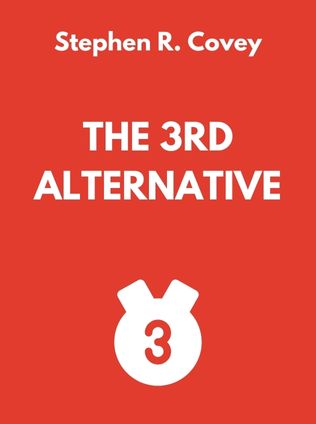
The 3rd Alternative
Solving Life's Most Difficult Problems
By Stephen R. Covey
Published 10/2011
About the Author
Stephen R. Covey, Ph.D., is a renowned leadership authority, family expert, teacher, and organizational consultant. He co-founded FranklinCovey Co. and is the author of several international bestsellers, including The 7 Habits of Highly Effective People, which has sold over 20 million copies worldwide. Covey's influence extends far beyond his written work; he was named one of TIME Magazine's 25 Most Influential Americans. He holds the Jon M. Huntsman Presidential Chair in Leadership at the Huntsman School of Business at Utah State University, demonstrating his ongoing commitment to education and leadership development.
Main Idea
In The 3rd Alternative: Solving Life's Most Difficult Problems, Stephen R. Covey introduces a radical new approach to conflict resolution and collaboration. The core concept of the book is deceptively simple yet profound: in most conflicts, there are two opposing alternatives—my way and your way. Covey proposes a third, superior alternative—"our way"—that transcends compromise and results in a win-win situation for all parties involved. This 3rd Alternative is based on synergy, where the combined strengths of the parties involved produce outcomes far greater than what either could achieve alone.
Table of Contents
- Introduction
- The 3rd Alternative
- The Four Paradigms
- Steps to Synergy
- The 3rd Alternative at Work
- The 3rd Alternative at Home
- The 3rd Alternative at School
- The 3rd Alternative in Society
- The 3rd Alternative in the World
- The 3rd Alternative in Life
The 3rd Alternative
At the heart of Covey's approach is the idea that most conflicts are traditionally viewed through a binary lens—my way or your way. This perspective often leads to compromise, where neither party gets what they truly want. Covey challenges this by suggesting a third way, a synergistic solution that he calls the "3rd Alternative." This alternative is not a compromise but a solution that fully satisfies all parties involved. Covey states, "The 3rd Alternative transcends the traditional win-lose or lose-lose paradigms of conflict resolution."
"Like musical notes, synergistic people do not lose their identity. They combine their strengths with the strengths of others to produce a result far greater than anything either could achieve alone." - Stephen R. Covey
The Four Paradigms
The journey to finding the 3rd Alternative begins with adopting four new paradigms of thinking:
I See Myself
The first paradigm is self-awareness. Covey emphasizes the importance of understanding one's own motives, uncertainties, and biases. This introspection allows individuals to approach conflicts without the baggage of preconceived notions. Covey writes, "I have examined my own assumptions. I am ready to be authentic with you." This paradigm shifts the focus from seeing one's side to seeing oneself.
I See You
The second paradigm involves empathy and respect for the other person. In traditional conflicts, people often see their opponents as mere representatives of the opposing side rather than as unique individuals. Covey encourages readers to move past stereotypes and understand the person behind the conflict. This approach aligns with modern collaborative practices in business, where understanding the client's unique needs is crucial.
Sign up for FREE and get access to 1,400+ books summaries.
You May Also Like
The Subtle Art of Not Giving a F*ck
A Counterintuitive Approach to Living a Good Life
By Mark MansonRich Dad Poor Dad
What the Rich Teach Their Kids About Money - That the Poor and Middle Class Do Not!
By Robert T. KiyosakiHow To Win Friends and Influence People
The All-Time Classic Manual Of People Skills
By Dale CarnegieQuiet: The Power of Introverts
The Power of Introverts in a World That Can't Stop Talking
By Susan Cain



















